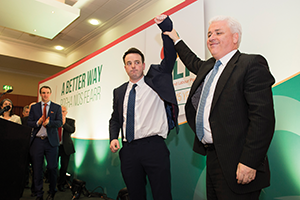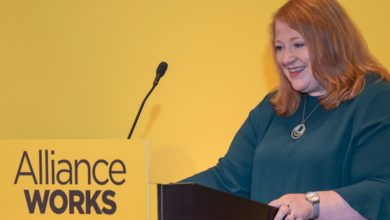A new hope
In his maiden address to party delegates, the new leader of the SDLP, Colum Eastwood MLA, spoke of a party ready to win again.
At its annual party conference in October, SDLP members voted for Colum Eastwood MLA as their new party leader. Faced with the uphill task of reviving the flagging party’s fortunes, Eastwood’s maiden speech as party leader, focused on the future of both the island of Ireland and his party.
Beginning by paying his respects to the party’s previous leader, Alasdair McDonnell MP, Eastwood praised his predecessor as a man who “stretched every fibre of his being” for the SDLP and promised that in the months and years to come McDonnell’s “abundance of life and love” for the party will not be forgotten.
Big ideas
Reflecting on the history of the party he now leads, Eastwood said that the SDLP were the most successful political party in the history of Ireland. He claims that its success can be seen every day in the peace that now prospers between Britain and Ireland and the establishment of the power sharing institutions that were created thanks to the party’s “big ideas and through dogged determination.”
Crediting these big ideas to previous leaders of the SDLP like Hume, Mallon and Rodgers, Eastwood said that the public know the history of the SDLP and the peace and possibility that stem from it but admitted that “politics was not a game of fond recollection.” At some point in the past 15 years, according to Eastwood, the SDLP has drifted into the political mire, focusing too much on past success and not enough on the fate and future of the country. Recognising the fact and determined to change it, Eastwood claimed that those days are done and the only conversations the SDLP must now focus on will be “about shaping this country for the next 20, 30 years and beyond.”
Stressing that the party’s voice remains as relevant now as it ever has, the Derry native said that his party shouldn’t be afraid to admit that whilst a 32 county Ireland remains its ultimate goal, the arguments made in support of it have, so far, lacked any buy-in for the man on the street. To achieve its ultimate goal, Eastwood claimed that Irish nationalism’s big idea must now be to have a “selfish and strategic” interest in making Northern Ireland work.
A prosperous north
Quoting the former British Prime Minster Gordon Brown on the importance of ensuring the desirable is popular, electable and credible, Eastwood said that making Northern Ireland work will prove challenging but ensuring that the British Treasury’s “annual subvention” becomes a thing of the past will  ultimately aid Irish nationalism. Eastwood believes that the economic impracticability of a United Ireland at present makes the prospect unpopular and unelectable in the hearts and minds of many voters.
ultimately aid Irish nationalism. Eastwood believes that the economic impracticability of a United Ireland at present makes the prospect unpopular and unelectable in the hearts and minds of many voters.
In order to secure a prosperous North, Eastwood believes a major retooling of Northern Ireland’s economy is a necessity. Difficult choices will need to be made, however, the SDLP will continue to resist “the Tory doctrine of stripping the state back to its barest form” with Eastwood clear that “social democracy is about growing our collective wealth through investing in infrastructure, investing in people and investing in the future.”
It is in the desire to get Northern Ireland working that Eastwood believes his party now “holds more common ground with unionism.” He claims that while constitutional change will always be the product of persuasion, making Northern Ireland work is the common ground upon which strong effective relationships between his party and “willing partners in unionism” can be formed. Unionists, Eastwood states, will respond positively to this invitation that focuses on the healthy common ground both viewpoints hold.
Reinvigoration
Focusing on his party’s support base which has, much like the UUPs, decreased as the more radical parties on either side of Northern Ireland’s political divide increased in popularity post 1998, Eastwood believes that many in Northern Ireland are ready for a new voice. Claiming the devolved institutions at Stormont “cultivated cynicism at a frightening rate” he suggests that at present, the public’s ambition and belief in Northern Ireland’s government has been ripped to shreds.
He blames this malaise on the DUP and Sinn Féin, the two dominant political parties in the power sharing agreement, who will, he claims “talk of fresh starts and new beginnings” in the days and weeks following the announcement of their latest agreement. However, Eastwood points to a massive surge in hospital waiting lists, and the confusion and chaos in the reform of education as proof they “are tired out.”
He then went on to suggest that by far their biggest failure was their inability to show that politics retains the power to bring positive change. From the pedestal of 1998 to now, turnout at elections has plummeted and the root cause of this is, Eastwood believes, the inability of the dominant parties to work together for a better Northern Ireland.
“The best that can be said for Stormont’s current leadership is that they are failing because they are unused to the demands and techniques of government,” he said. “They are stuck in a peace process mentality, stuck in a mentality of constant negotiation. They’ve shown themselves incapable of making the next intellectual leap needed for the delivery of good governance. It is our job to demonstrate that we, as the alternative, can.”
Positive politics
However, Eastwood knows this will not be an easy task. As his speech drew to a close he spoke of the need to “demonstrate that the SDLP is again capable of showing that high politics, at its best, is of intimate value to people.”
Many observers may feel that for many years the SDLP has been left staring into the political abyss, however, it is Eastwood’s belief that the tide can still be turned with clear, positive politics. “We must show that politics is again capable of creating the change we want to see,” he said. “We’ve got to show ourselves to be good enough and competent enough to earn that trust.
“We have been asked to accept the inevitable, to go quietly into the night. But the timeless fascination with politics is that there is no such thing as inevitable. There is a future to be fought for. We hold faith that the gravity of big ideas can turn a tide. We can make the political weather again. We can win again, it’s time to win again,” he concluded.





